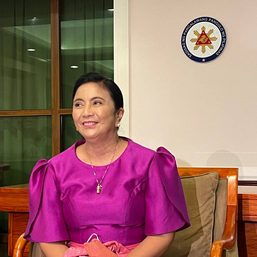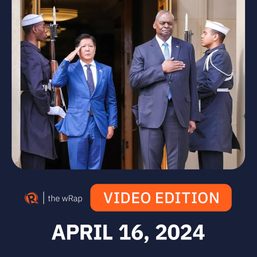SUMMARY
This is AI generated summarization, which may have errors. For context, always refer to the full article.

When Ferdinand “Bongbong” Marcos Jr was studying at the Wharton Business School of the University of Pennsylvania from 1979 to 1981, he lived in a house studded with rooms: four bedrooms and four-and-a-half bathrooms. The house on 19 Pendleton Street in Cherry Hill, New Jersey was in a leafy, wealthy area, sprawled on half an acre of land or about 2,000 square meters.
His home was less than a 30-minute drive to the university.
You can see current photographs of the house from a street view here.
Nearby, just a few minutes walk away, was the house for Marcos Jr’s security and servants, on 4 Capshire Drive. It had four bedrooms and four-and-a-half bathrooms. This second house was bought for $90,000 in 1978 while the first house cost $119,000. (They have since been sold.)
They were not in the names of the Marcoses but the listed agent was Tristan Beplat, a former senior vice president at the Manufacturers Hanover Trust Co. who was in charge of Overseas/Asian Affairs. Beplat appeared to have been cozy with then-president Marcos even before these real estate purchases. In 1971, Marcos awarded him a presidential medal.
The New York Times later reported that, in the mid-1980s, Beplat’s name came up during an investigation by New Jersey officials “seeking to untangle the financial web spun in that state by Mr. Marcos.” Beplat told investigators that “Mr. Marcos had asked him to acquire homes in New Jersey for use by the Marcos children while they attended Princeton University. [Imee had her own home, an 18th-century estate in Princeton, New Jersey.] In a deposition, Mr. Beplat said he had been wired almost $500,000 from the Philippine Mission in the final days of the Marcos regime.”

Who paid for tuition?
By the time the Marcos children were in college, the family had at least 15 bank accounts in the US under false names. The tuition for Imee’s studies in Princeton and Bongbong’s studies in Wharton came from some of these accounts and each of them received a monthly allowance of $10,000.
In the case of Imee, government funds from the Philippine National Bank were used to pay for her tuition of $4,445 a semester. The checks for Imee’s Princeton tuition came directly from government accounts. In the absence of data, we can assume that Bongbong’s tuition was similarly paid for by government funds.
These facts on the homes and tuition were documented by historian Ricardo Manapat in his book, “Some are Smarter Than Others: The History of Marcos’ Crony Capitalism,” the latest edition of which was published in 2020.
The Wharton question
We still don’t know why Wharton admitted Marcos Jr to its graduate school when he had no undergraduate degree. But he did get some help from Frank Zingaro, a friend of his father and at the time vice-president of Caltex Petroleum Corp. and president of the Philippine-American Chamber of Commerce of New York, according to researchers from the University of the Philippines (UP) Third World Studies Center. Zingaro offered to “personally handle” the submission of Marcos Jr’s application papers.
By May 1979, Jose A Syjuco, Jr., deputy chief of mission of the Philippine Embassy in London, sent a telex to Malacañang to inform Bongbong that he must “rush Wharton forms to Ernie Pineda [Ernesto C. Pineda, Philippine consul general in New York] soonest. He will make [a] strong attempt to push it through but he needs the basic application,” the UP researchers wrote.
While in the US, Marcos Jr was accorded special treatment. In 1979, as he was about to start his studies in Wharton, “with appropriate bodyguards,” he was “accredited by the Philippine Mission to the UN as its ‘military advisor’ with the rank of attaché…The nominal UN assignment is presumably intended to give Bongbong diplomatic immunity while he is in the US,” according to a declassified State Department cable cited by the UP researchers.
His academic performance, however, was lackluster. The UP researchers, who published their work in Vera Files, found that Marcos Jr failed to earn credit for a core subject, administration, in the fall term of 1979; earned credit in only two of the five courses he passed in the spring term of 1980; and he did not pass any of the courses during the fall term of 1981, with two incompletes and one NR (no grade reported for course).
One telling incident gives us a glimpse into Marcos Jr’s life of entitlement as a student. In 1981, a state trooper stopped Bongbong for driving over the speed limit at the New Jersey Turnpike, the UP researchers wrote, citing a November 25, 1982 article in The Cincinnati Enquirer. The article said that “the state trooper who pulled over the young Marcos, a student at the University of Pennsylvania, was startled to see a semi-automatic rifle at the backseat and a revolver strapped to the leg of a young woman in the passenger seat.” Bongbong flashed a diplomatic passport and was let go.
His father knew the son best. In the June 12, 1972 entry from President Marcos’ diary, he wrote: ‘…Bongbong is our principal worry. He is too carefree and lazy…For the boy must get character…The boy must realize his weakness – the carefree ways that may have been bred in him.”

While Marcos Sr wrote this when his son was in boarding school in England, the traits had stayed with Marcos Jr till his post-graduate years.
Add a comment
How does this make you feel?
![[Newspoint] Improbable vote](https://www.rappler.com/tachyon/2023/03/Newspoint-improbable-vote-March-24-2023.jpg?resize=257%2C257&crop=339px%2C0px%2C720px%2C720px)
![[Newspoint] 19 million reasons](https://www.rappler.com/tachyon/2022/12/Newspoint-19-million-reasons-December-31-2022.jpg?resize=257%2C257&crop=181px%2C0px%2C900px%2C900px)



![[In This Economy] Marcos’ POGO ban is popular, but will it work?](https://www.rappler.com/tachyon/2024/07/thought-leaders-marcos-pogo-ban.jpg?resize=257%2C257&crop=255px%2C0px%2C720px%2C720px)
![[Rappler Investigates] POGOs no-go as Typhoon Carina exits](https://www.rappler.com/tachyon/2024/07/newsletter-graphics-carina-pogo.jpg?resize=257%2C257&crop=424px%2C0px%2C1080px%2C1080px)






![[OPINION] If it’s Tuesday it must be Belgium – travels make over the Marcos image](https://www.rappler.com/tachyon/2024/04/tl-travel-makeovers-marcos-image.jpg?resize=257%2C257&crop_strategy=attention)



There are no comments yet. Add your comment to start the conversation.